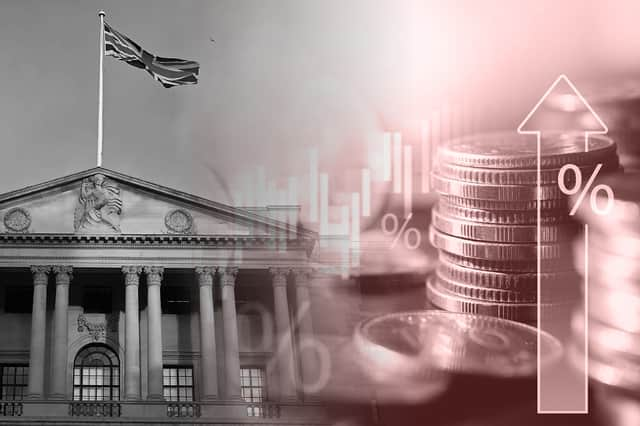Bank of England has increased interest rates to 5.25% - taking base rates to their highest since 2008
and live on Freeview channel 276
Interest rates have risen to 5.25% from its current 5% as the Bank of England battles to control high prices.
The Bank has now raised interest rates for the 14th time in a row. Interest rates were last at 5.25% in April 2008 - 15 years ago.
This means higher interest rates on mortgages and loans for some people- as well as higher saving rates.


Inflation in the UK is higher than usual and is putting many households under pressure. Although inflation fell by more than expected in June and at 7.9% is at its lowest level in over a year - it is still higher than the 2% the Bank aims for.
Andrew Bailey, the Bank of England's governor, has previously denied the Bank has been trying to cause a recession as a way to tackle soaring prices.
"Many people with mortgages or loans will be understandably worried about what this means for them... but inflation is still too high and we've got to deal with it," he said at the Bank's previous interest rate decision."
On Wednesday (2 August), Rishi Sunak told LBC radio that inflation was not falling as fast as he would like, but that he believed people could "see light at the end of the tunnel".
The prime minister, who has promised to halve inflation from above 10% by the end of the year, said: “I know families are struggling with the cost of living and that’s why I set it out as my first priority to halve inflation, and we’re making progress.
“Is that as fast as I’d like? No. Is it as fast as anyone would like? No.
“But the numbers most recently that we had shown that we’re heading in the right direction, inflation is coming down, and I think people can see light at the end of the tunnel.”
According to Nationwide, house prices are falling at their fastest annual rate in 14 years in July - showing signs that higher rates are already affecting the UK.
Rachel Reeves MP, Labour’s Shadow Chancellor, responding to interest rates rising to 5.25% today, said: “This latest rise in interest rates will be incredibly worrying for households across Britain already struggling to make ends meet.
“The Tory mortgage bombshell is hitting families hard, with a typical mortgage holder now paying an extra £220 a month when they go to re-mortgage. Responsibility for this crisis lies at the door of the Conservatives that crashed the economy and left working people worse off, with higher mortgages, higher food bills and higher taxes.
“After thirteen years of economic failure and managed decline under the Conservatives, it’s time for change. Labour’s plan to build a strong economy will boost growth, increase wages and bring down bills.”
A survey of economists found they believe there was a 64% probability of the interest rate being increased by 0.25 percentage points on Thursday, and a 36% chance of a 0.50 percentage points rise.
What impact will it have?
For mortgage holders with variable or tracker mortgages, or anyone looking to secure a new fixed-rate deal, it will cost more to borrow the money for their homes.
The 0.25% increase will see a rise of around £23.71 more a month for those on a typical tracker mortgage. For those on a standard variable rate (SVR) mortgages face a £15.14 jump on average.
The majority of mortgage holders are on fixed-rate deals which protects them from rising interest rates, however, around 80,00 deals will end by the end of 2023, and 1.6 million will end in 2024.
Other impacts of higher rates include first-time home buyers being priced out of the market and also charges on some un-fixed loans and credit cards going up.
Comment Guidelines
National World encourages reader discussion on our stories. User feedback, insights and back-and-forth exchanges add a rich layer of context to reporting. Please review our Community Guidelines before commenting.
